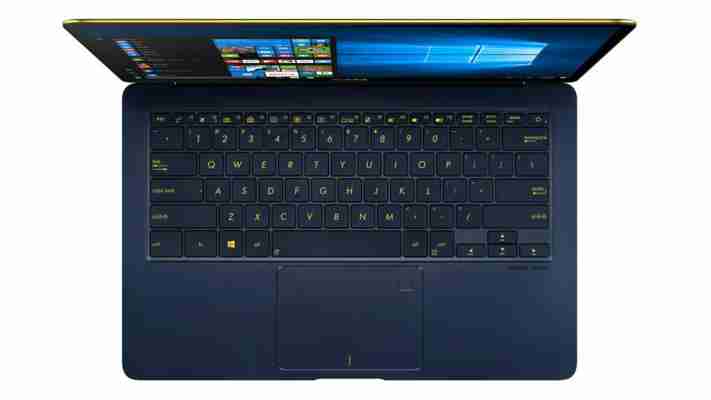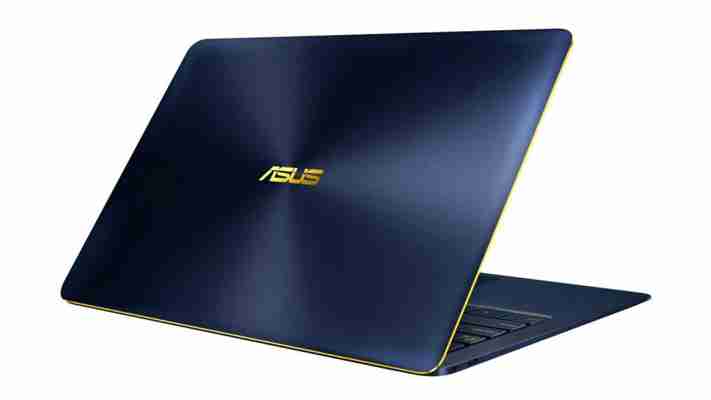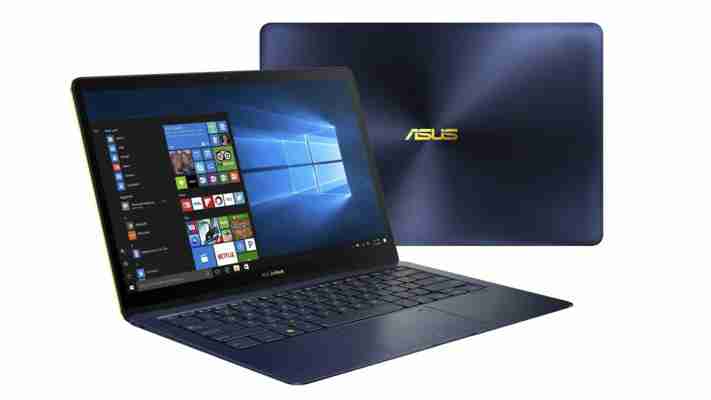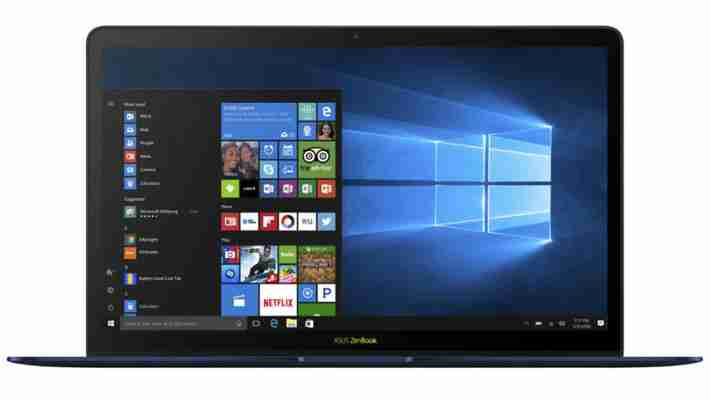Just as IBM did with the ThinkPad, Asus has made a design decision with the ZenBook and stuck with it. The result: one glance and you know exactly what you’re getting.
Asus' new ZenBook 3 Deluxe is an ultra-thin laptop, with a brushed aluminium finish and rounded corners. Even with the gold edging, the royal blue finish you see here isn’t to everyone’s taste, but Asus offers it in aluminium grey as well.
READ NEXT: The best laptops you can buy today
Asus ZenBook 3 Deluxe UX490UAR review: Performance
What’s changed from predecessors is the specification. An Intel Core i7-8550U processor is the key element, with the “8” signifying that this is an eighth-generation chip. With four cores and eight threads, 16GB of RAM and a fast 512GB NVMe SSD, this is a machine set up for speed.

However, I was disappointed in its overall score of 61 in our benchmarks. It performed well in our shorter image-editing tests, but once the benchmarks stretched beyond ten minutes the cooling system hit its limit. It only performed a bit better in the Geekbench 4 tests: 4,699 single-core, 11,907 multicore.
Tellingly, the case near the processor grew hot to the touch as well. All of these results were with Asus’ Quiet Fan utility switched off – switch it on, and the ZenBook will attempt to cool itself without using the fan and you can expect even slower performance.
Although I would have preferred stronger scores, my suspicion is that the majority of people will still find this a nippy machine. For most, a far bigger factor is battery life, and here the ZenBook lasted a creditable 8hrs 2mins in our video rundown tests. Add the 12.9mm-thick chassis and 1.1kg weight, and this is one of the most portable 14in laptops around.

Asus ZenBook 3 Deluxe UX490UAR review: Features
Despite this slenderness, the speakers are great. Gone are the days of weedy sound in ultraportables: the four speakers combine with excellent effect, adding mood to movies and vim to vocals.
The screen is also a pleasure to watch films on, with a contrast ratio of 1,414:1 and a maximum brightness of 289cd/m2 on battery and 337cd/m2 when plugged in. Don’t expect it to display every colour on the spectrum: it covered 82.1% of the sRGB gamut in our tests, which dropped to 59% for the Adobe RGB gamut.

Those figures are similar to the HP Envy 13 , but the ZenBook’s Delta E figures show this is a superior panel. Its worst result was 5.05, for greens, but an average of 2.08 is darn close to a calibrated monitor. In short, so long as you aren’t a photographer or video editor, you’ll be happy.
It’s a 14in panel with a Full HD resolution, and that 0.8in over the 13.3in panels in most ultraportables is obvious in practice. If your eyesight isn’t as sharp as it once was, you’ll like the fact you don’t need to lean in as close to see what’s on-screen. It’s just a shame that Asus hasn’t slimmed down the side bezels: at 9mm, they’re twice the size of some rivals.

I’m also surprised it hasn’t inserted a Windows Hello-compatible infrared webcam into the generous 18mm bezel at the top (you’re stuck with a miserable VGA webcam for Skype calls). Instead, it expects you to enrol your fingerprint via the tiny square sensor tucked into the top-right of the touchpad. This is okay, but with so much space elsewhere, it’s an odd decision.
The keyboard is quiet to type on and, with large keys, touch typists will have no trouble hitting high speeds. Asus makes no silly mistakes with positioning too, with separated cursor keys, a double-height Enter key and a generously sized Backspace button. Don’t expect much feedback from the short-travel keys, though.
I have mixed feelings about the physical connections. I like the two Thunderbolt 3 ports, because this gives you so many options: buy a Thunderbolt 3 dock and you can turn this machine into a proper workstation: dual 4K displays at 60Hz, Ethernet connectors, USB ports, the lot.
But, for now, the lack of conventional USB and video ports means you’ll need to carry around the mini USB-C port replicator Asus bundles in the box: this gives you a USB Type-A port and HDMI output. Still, you’re better off buying a USB-C travel adapter such as the Kingston Nucleum .
READ NEXT: The best UK laptop deals available right now
Asus ZenBook 3 Deluxe UX490UAR review: Verdict
When you’re paying almost £1,400 for a laptop, you probably don’t want to fork out more cash for extras. My take: save your money and buy a Dell XPS 13 instead.
